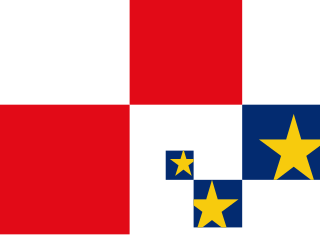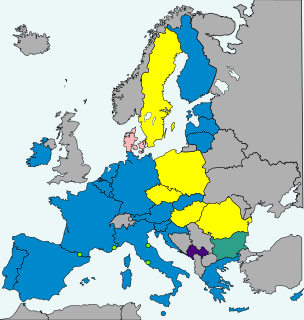
Referendums in the United Kingdom are occasionally held at a national, regional or local level. National referendums can be permitted by an Act of Parliament and regulated through the Political Parties, Elections and Referendums Act 2000, but they are by tradition extremely rare due to the principle of parliamentary sovereignty meaning that they cannot be constitutionally binding on either the Government or Parliament, although they usually have a persuasive political effect.

The United Kingdom European Communities membership referendum, also known variously as the Referendum on the European Community , the Common Market referendum and EEC membership referendum, took place under the provisions of the Referendum Act 1975 on 5 June 1975 in the United Kingdom to gauge support for the country's continued membership of the European Communities (EC) — often known at the time as the European Community and the Common Market — which it had entered two and a half years earlier on 1 January 1973 under the Conservative government of Edward Heath. Labour's manifesto for the October 1974 general election had promised that the people would decide through the ballot box whether to remain in the EC.

This is a list of referendums related to the European Union, or referendums related to the European Communities, which were predecessors of the European Union. Since 1972, a total of 48 referendums have been held by EU member states, candidate states, and their territories, with several additional referendums held in countries outside of the EU. The referendums have been held most commonly on the subject of whether to become a member of European Union as part of the accession process, although the EU does not require any candidate country to hold a referendum to approve membership or as part of treaty ratification. Other EU-related referendums have been held on the adoption of the euro and on participation in other EU-related policies.

For Fatherland and Freedom/LNNK was a free market national conservative political party in Latvia. In 2011, it dissolved and merged into the National Alliance.

Turkey is negotiating its accession to the European Union (EU) as a member state, following its application accede to the European Economic Community, the predecessor of the EU, on 14 April 1987. After the ten founding members, Turkey was one of the first countries to become a member of the Council of Europe in 1949. The country was also an associate member of the Western European Union from 1992 to its end in 2011. Turkey signed a Customs Union agreement with the EU in 1995 and was officially recognised as a candidate for full membership on 12 December 1999, at the Helsinki summit of the European Council.

Euroscepticism, i.e. the opposition to policies of supranational European Union institutions and/or opposition to Britain's membership of the European Union, has been a significant element in the politics of the United Kingdom (UK). A Eurobarometer survey of EU citizens in 2009 showed that support for membership of the EU was lowest in the United Kingdom, alongside Latvia and Hungary.

The 2013 enlargement of the European Union saw Croatia join the European Union as its 28th member state on 1 July 2013.

The relations between Switzerland and the European Union (EU) are framed by a series of bilateral treaties whereby the Swiss Confederation has adopted various provisions of European Union law in order to participate in the Union's single market, without joining as a member state. All but one of Switzerland's neighbouring countries are EU member states.

Sweden does not currently use the euro as its currency and has no plans to replace the krona in the near future. Sweden's Treaty of Accession of 1994 made it subject to the Treaty of Maastricht, which obliges states to join the eurozone once they meet the necessary conditions. Sweden maintains that joining the ERM II is voluntary, and has chosen to remain outside pending public approval by a referendum, thereby intentionally avoiding the fulfilment of the adoption requirements.

A non-binding referendum on introduction of the euro was held in Sweden on 14 September 2003. The majority voted not to adopt the euro, and thus Sweden decided in 2003 not to adopt the euro for the time being. Had they voted in favour, the plan was that Sweden would have adopted the euro on 1 January 2006.
Events from the year 2003 in the European Union.
The 2003 Estonian European Union membership referendum took place on 14 September 2003 to decide whether Estonia should join the European Union (EU). Just over two-thirds of voters voted Yes and Estonia joined the EU on 1 May 2004.

The 2003 Lithuanian European Union referendum took place from 10 May to 11 May 2003 to decide whether Lithuania should join the European Union (EU). Over 90% of those who voted supported membership and Lithuania joined the EU on 1 May 2004.

A referendum on European Union membership was held in Malta on 8 March 2003. A narrow majority voted in favour of joining but the opposition Labour Party rejected the results. The victory of the Nationalist Party in the 2003 general election confirmed the result of the referendum and Malta joined the EU on 1 May 2004.
A referendum on joining the European Union was held in Hungary on 12 April 2003. The proposal was approved by 83.8% of voters, with a voter turnout of 45.6%. Hungary subsequently joined the EU on 1 May 2004.

There are five recognised candidates for future membership of the European Union: Turkey, North Macedonia, Montenegro, Albania, and Serbia. All except Albania and North Macedonia have started accession negotiations. Kosovo, whose independence is not recognised by five EU member states, and Bosnia and Herzegovina are recognised as potential candidates for membership by the EU. Bosnia and Herzegovina has formally submitted an application for membership, while Kosovo has a Stabilisation and Association Agreement (SAA) with the EU, which generally precedes the lodging of membership application. In July 2014, Jean-Claude Juncker announced that the EU has no plans to expand before 2019 while Serbia and Montenegro, the most advanced candidates, are expected to join before 2025. While the others are progressing, Turkish talks are at an effective standstill.
Five referendums were held in Switzerland during 2005. The first two were held on 5 June on Switzerland joining the Schengen Area and whether registered partnerships for same-sex couples should be introduced. Both questions were approved. The third was held on 25 September on a federal resolution on extending the agreement on free movement of people to new members of the European Union, and was also approved. The final two were held on 27 November on a popular initiative "for food from an agriculture free of genetic modification" and on a labour law related to the opening times of shops in public transport hubs. Both were approved.

A referendum on the EU accession of the Republic of Croatia was held on 22 January 2012. Croatia finished accession (membership) negotiations on 30 June 2011 and signed the Treaty of Accession on 9 December 2011, setting it on course to become the bloc's 28th member state. The Constitution of Croatia requires that a binding referendum be held on any political union reducing national sovereignty, such as via European Union membership. On 23 December 2011 the Croatian Parliament made a preliminary decision on EU accession and determined that the referendum would be held on 22 January 2012. The 2012 Croatian EU accession referendum was the first referendum held in Croatia since the Croatian independence referendum held more than 20 years earlier, in 1991.
Poland has been a member state of the European Union since 1 May 2004, with the Treaty of Accession 2003 signed on 16 April 2003 in Athens as the legal basis for Poland's accession to the EU. The actual process of integrating Poland into the EU began with Poland's application for membership in Athens on 8 April 1994, and then the confirmation of the application by all member states in Essen from 9–10 December 1994. Poland's integration into the European Union is a dynamic and continuously ongoing process.

Since the foundation of the European Communities, the United Kingdom has been an important neighbour and is currently a major member, until its withdrawal.




















